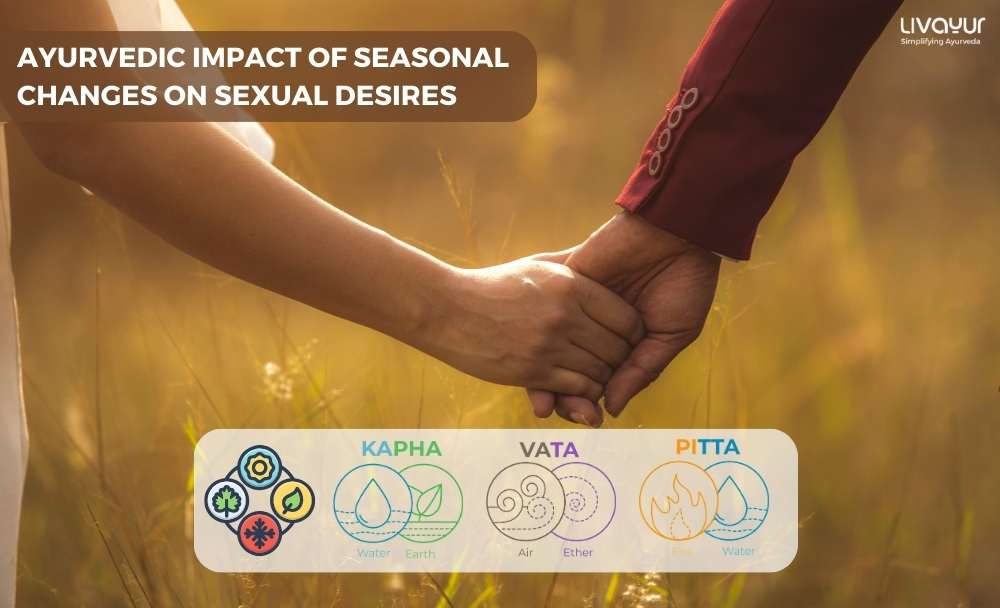This article has been reviewed by experts

The dynamic interplay between human sexuality and seasonal shifts is an ancient tale woven into the fabric of Ayurveda. It explains the complex dance of the doshas, or Pitta, Kapha, and Vata, that exists within each of us. With its distinct Doshic imprint, every season creates a symphony that speaks to both our bodily and emotional selves. This investigation unfolds the story of Ayurveda by examining how seasonal variations affect our sexual health rhythms. It reveals a relationship that goes beyond the physiological, where the rhythms of nature blend with the sounds of human closeness. Come along as we unravel this long-standing connection.
Ayurvedic View on Seasonal Changes
Ayurveda identifies three primary bio-energies, called doshas – Vata, Pitta, and Kapha. These doshas regulate various physiological and psychological functions in the body, and their balance is closely linked to seasonal changes. Each season is associated with a predominance of one or more doshas, which directly impact our physical and mental states. [1, 3, 4]
- Vata Season (Fall and Early Winter): There are specific traits that emerge throughout the Vata season, which spans autumn and early winter and is characterised by cold, dry and windy weather. The Vata dosha is elevated during this season, which can lead to feelings of restlessness and dryness in the body. Because of Vata’s unpredictable character, which can cause oscillations in desired intensity, these bodily changes can also have an effect on sexual impulses. The way the doshas interact during this time highlights the complex relationship between seasonal variations and human physiology, which is shaped by external factors that gently influence internal experiences, including sexual encounters.
- Pitta Season (Summer): With summer’s scorching, sharp, and powerful features, the Pitta dosha is central to the oppressive heat. As the season brings more warmth and intensity, it also defines Pitta’s effect on the constitution as a whole. Since the intensity of the external environment reflects the intensity of inside feelings, the summer heat wave may be correlated with an increase in sexual cravings. But a careful balance is necessary, as too much Pitta can tilt the scales in favour of irritability or impatience, highlighting the complex interplay between seasonal characteristics and the complex terrain of human sexuality.
- Kapha Season (Late Winter and Spring): The qualities of chilly, wet, and heavy characterise the atmosphere as winter bids adieu and spring open its petals. This shift signals when the Kapha dosha becomes more prominent and emphasises feelings of heaviness and even fatigue. Elevated Kapha in late winter and early spring has an effect on more than just physical health; it also affects other areas of general well-being, including libido. Because of its natural heaviness, Kapha can be associated with a lower energy state, which can introduce a delicate interaction between the qualities of the dosha and the complex terrain of human sexuality throughout these seasonal fluctuations.
Influence on Physical Health
Seasons have a significant impact on our physical health because they create a delicate balance between the environment and our health. Within the field of Ayurveda, this complex interaction also includes how seasonal changes affect one’s bodily health and, consequently, sexual health.
- Hormonal Balance: According to Ayurvedic knowledge, seasonal fluctuations can still affect hormonal balance. Consider the summertime’s sun-filled days. The body produces more vitamin D when exposed to more sunlight, and vitamin D is essential for reproductive health. The complex interplay between seasonal variations in sunlight, hormones, and the body’s chemistry highlights the complex relationship between environmental influences and our physiological equilibrium. [2]
- Reproductive Health: Throughout the seasons, the doshic dance has an impact on reproductive health. To improve reproductive health, Ayurveda suggests modifying lifestyle and food choices to correspond with the dosha that is prominent at particular periods of the year. In order to bring harmony to the complex symphony of life, this holistic approach acknowledges the dynamic nature of the body’s requirements during different seasons. [3]
Seasonal Dynamics and Dietary Strategies for Ayurvedic Sexual Wellness [1, 4]
Ayurveda believes that sexual health can be significantly affected by seasonal changes. Every season brings distinct climatic conditions that can either increase or reduce the doshas, which are the unique combination of physical, emotional, and mental characteristics that define our individual constitutions.
During the summer season (Grishma), the intense heat and unhealthy wind can aggravate Vata dosha, leading to a decrease in sexual desire and performance. To maintain sexual health during this time, Ayurveda recommends consuming light, cooling, and hydrating foods, such as rice, lentils, and plenty of water.
The monsoon season (Varsha) is characterized by clouds, rain, and increased humidity. These conditions can aggravate both Vata and Pitta doshas, further impacting sexual health. Ayurveda recommends consuming sour and salty foods, such as old barley, rice, and meat soup, to balance the doshas.
In the late autumn season (Hemanta), the cold winds and chillness can pacify Pitta dosha and increase overall strength. This can be a favourable time for sexual health. Ayurveda recommends consuming unctuous, sweet, sour, and salty foods, such as new rice and flour preparations, to maintain doshic balance.
By understanding the impact of seasonal changes on doshas and following Ayurvedic dietary and lifestyle recommendations, individuals can maintain optimal sexual health throughout the year.
FAQs
How does Ayurveda link seasonal changes with sexual health?
Ayurveda associates seasonal shifts with dynamic doshas (Vata, Pitta, Kapha), affecting both physiology and emotions in sexuality.
What’s the impact of the Vata season on sexual desires?
Vata’s rise in the cold, dry Fall might lead to restlessness, impacting desire intensity.
What dietary tips for summer does Ayurveda suggest for sexual wellness?
Ayurveda recommends light, cooling foods like rice to balance Vata during the intense heat.
How does Ayurveda adjust the diet for the monsoon season’s impact on sexual health?
For Varsha (monsoon), Ayurveda advises sour foods to balance Vata and Pitta doshas.
What’s the role of late autumn in Ayurvedic sexual wellness, and what foods are suggested?
Late autumn pacifies Pitta; Ayurveda recommends sweet, sour foods like new rice for balance.


















